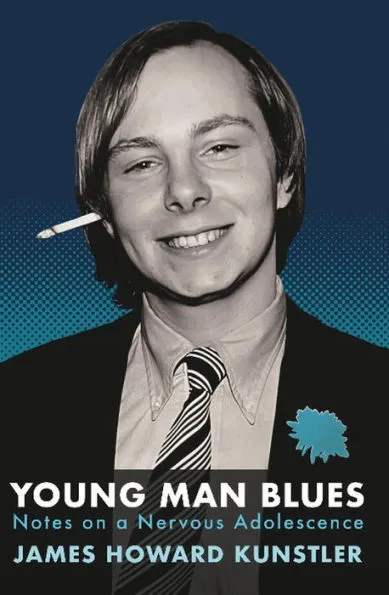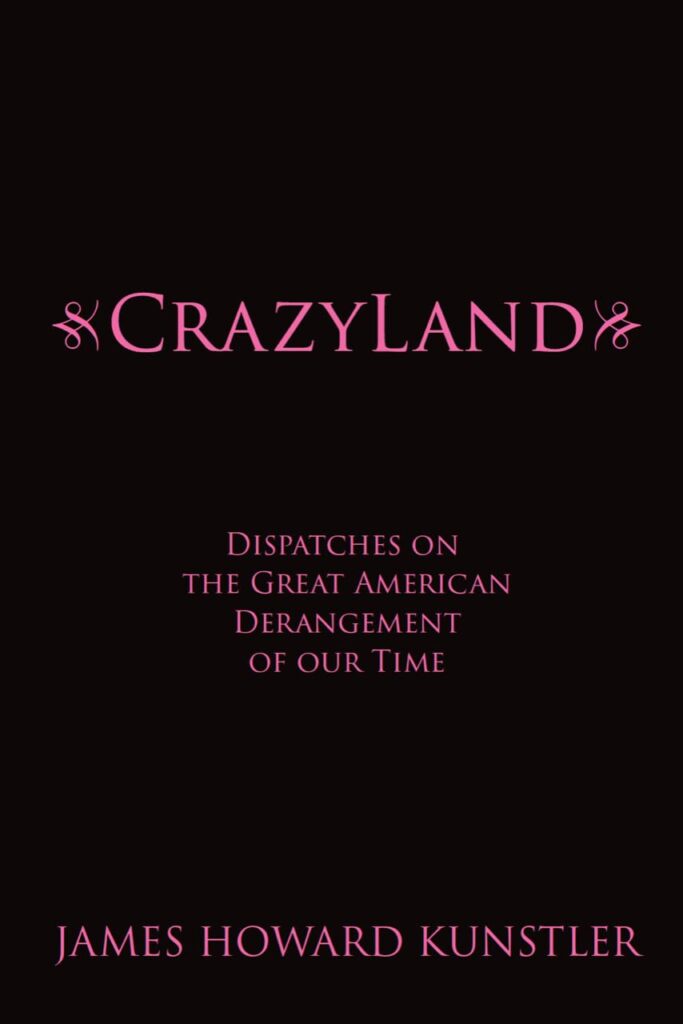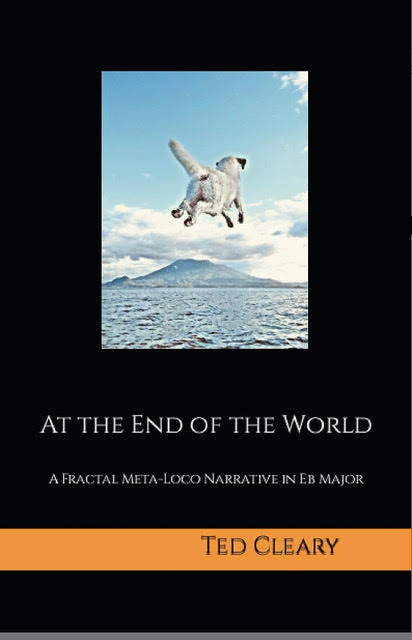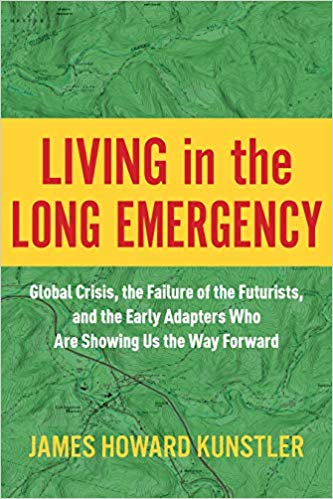Support this blog by visiting Jim’s Patreon Page
And thanks to all my Patrons for your support!
With 45 years in petroleum geology, Art Berman describes himself as an energy realist who integrates energy, the economy, the environment, and human behavior into his view of the industry and society. He routinely gives keynote addresses for energy conferences, boards of directors and professional societies. Berman has published more than 100 articles on energy and the effect on earth systems including climate. He has more than 40,000 followers on Twitter (@aeberman12) and dozens of free posts on his website artberman.com.
This chat was more contentious than I figured on going into it, but that’s okay. I don’t like to filibuster my podcast guests. Let’s just say there were a few times when we disagreed about some things. Listeners can take what they will from that.
The KunstlerCast theme music is the beautiful Two Rivers Waltz written and performed by Larry Unger
Direct Download: KunstlerCast_394 — Art Berman on the US Oil Scene
Please send questions and comments to jhkunstler@mac.com
This podcast is sponsored by Vaulted, an online mobile web app for investing in allocated and deliverable physical gold. Vaulted is backed by McAlvany Financial Group, which owns ICA, one of the largest and longest continuously operating full-service gold brokerage firms in the United States.
To learn more visit: Kunstler.com/vaulted
|
Order now! Jim’s new book Click here for signed author copies from Battenkill Books
|
Order now! Jim’s other new book |





 JHK’s Three-Act Play
JHK’s Three-Act Play











I too watched Art’s program with Nate Hagens on YouTube as well as listening to him on TNT Radio’s The Hrvoje Mori? Show. And I have followed him for many years as have you, JIm. Art has a frustrating way of framing his explanation of the situation with oil and its depletion (regional/global) in a different way each time. As I have a background in geology and paleontology, I found his ambivalent views on abiogenic oil particularly unconvincing (The Hrvoje Mori? Show).
Are we to believe from this interview that Art is a class A bullshitter. To state Nordstream 2 was to add a tiny percentage to the total gas supply to Europe sure does not coincide with ‘even’ the Wikipedia description. It suggests that the Nordstream 2 pipeline would double the capacity of gas shipped to European markets. Whether they accepted it or not is a moot point because that’s why it was built and that is why Biden stated publicly his intention of making the pipeline disappear.
I don’t know about double, but I agree with you, Nordstream 2 was a HUGE deal. It wasn’t conjured as a public works project.
It would have increased gas supplies to Europe considerably, and it would be RELIABLE. Even before the Russian Army moved to liberate Luhansk and Donetsk, the old pipeline through the Ukraine had proven to be less than reliable–largely due to Ukranian operators.
Berman said we need to reduce energy use. I agree. He said reducing energy use will hurt economic growth and lower living standards. I somewhat agree. One can have less “stuff” and still live well.
MOST INTERESTING–he said the current energy production situation will last another 4-6 months, then supply will start to decline, and by the end of the decade, US production (and hence global supply) will be down markedly, so prices will go up.
The European public is phase one of energy reduction–the embargo of Russian oil and gas led to increases in energy cost and “deindustrialization”. That’s what will be coming to the US.
The European people already have less stuff, so perhaps their reactions will be mild. I think Americans’ reactions will be harsher and more… volatile. We will see.
Well, avoiding Ukraine was the whole point of the NordStream 2. The two shutoffs for nonpayment during the Yushchenko regime shook western confidence in Russia’s supply obligations. Putin was convinced Ukraine could never be brought to pay until they were separated from the western suppliers on the end of the line.
NordStream 2 was designed to do just that: fully supply western customers without Ukraine on the tap. If Ukraine failed to pay, then shutoffs would occur. If the west preferred to supply Ukraine from their end, then they would have to pay as the terminal in Germany would be the entry point and Gazprom could reduce the outflow to match Ukraine’s need, forcing the west to stop such a thing.
This was known in Germany but the priority for them was reliable gas flow at a stable predictable price. The United States had a different priority after overthrowing the pro-Russian Ukrainian government: preserving Ukraine’s crucial chokehold on gas flowing westward.
Now that they’ve destroyed NordStream 2, Germany still gets half its original supply via the single surviving Nordstream 1 pipe. The Yamal pipe through Poland provides the rest, while the Ukraine pipes still carry the same supply to eastern and southern Europe as before the war.
At about the 17:40 portion of the interview, there was a persistent buzzing noise in the background like a phone was off the hook. Very strange.
Not a lot new here to ponder. EROEI is still the key to the future and the closer it gets to 1:1, the further up Schitt Creek we go. Art just took 72 minutes to say as much.
That was an interesting podcast.
A few points though, I feel Art left out, or sort of brushed over when speaking to the finite nature of our oil reserves.
While yes, our existing shale and oil fields may have an “expiration date”, the first order of the oil business is predicated upon exploration, thus enabling them to discover more and new areas for drilling and/or extracting oil from shale.
This requires the government to provide leasing opportunities to the oil companies in order to pursue these explorations for the future benefit of the whole country and its economy.
The entire process when it comes to delivering oil from exploration, to drilling, to refining, to delivering is an enormous undertaking that takes nearly a decade from beginning to end, the exploration effort itself being an enormously important and critical step toward providing the country with the fuel it will need in the future for its continued survival.
Thus, to withhold the ability to the lease the necessary areas for exploration, this most essential
step in the entire oil producing process, comes down to: no more exploration, no more oil, once existing reserves dry up.
And even should they come to their senses and change their mind down the road about opening up those leases again, they will have already set the entire process back years as that refined oil just doesn’t happen overnight.
The Biden administration’s dangerous and foolhardy decision to prevent the oil companies from opening up new leases for areas of exploration sets the entire process of future energy needs back years, while they pin their hopes on a somehow “magical transition” into renewables that, when boiled down into reality, is nothing more than a fantasy and a literal murder/ suicide pact for this country.
Whatever happened to the Art Berman that used to call shale oil the retirement party for oil companies? He seems to kinda of say it now, but very obtusely. If there are no more big oil plays to be discovered, then that is what it means. He was also more into how much more quickly shale oil platforms deplete than conventional oil drilling ones do. That seems not to be mentioned here much either. I almost feel like I’m confusing him with someone else I listened to in the past, but I don’t think so.
Art sounds like he is so worried about the future, he has to be in denial even to himself just to make it to the end of his life. He knows what is coming but won’t commit to really explaining it.
I think he said as much as he is comfortable saying. His livelihood is tied to the energy industry, he really does not want to imperil that TOO MUCH.
His comment that “investors see opportunities in renewable energy” may be true, in our distorted world, but it’s basically a sop to those who pay for his papers and presentations.
Mr. Berman’s numbers didn’t add up. I always thought the US used about 18 million barrels per day (BPD) of oil, down from close to 20 million.
I hear the “expert” say the US produces 13 and exports 4–that leaves 9.
But later, in minute 24, he elaborated, as he explained the refinery situation and noted the US imports 6-7 million BPD of mostly heavier crude.
OK. 13 – 4 + 7 = 16. That’s 4 million short of the 20 million BERMAN said the US uses.
I was disappointed that JHK did not pause and say “this doesnt add up, we are still 4 million BPD short”
It’s good to see that at least one American understands that Nordstream 2 never operated before the Americans blew it up and that it was the decision of the German “Bündnis90/Green” Party to forbid the German industry from buying Russian natural gas. They also decided to shut all atomic power plants. The Greens will be gone by 2025 thank goodness.
My boss, a German physicist, told me in the 1980’s that he thought it was clever for America to import all of their energy — expending the natural resources of foreign countries first — before depleting our own.
The blowing up of Nordstream was, is, an act of war, a huge crime.
Yes, Nordstream 2 had not operated. However, it was not built in a vacuum. Some one expended billions of euros to construct it because the existing natural gas infrastructure was deemed insufficient for future needs. Russia could supply those needs, hence the pipeline.
Yes, (it appears that) the Europeans cut off their noses to spite their face by “embargoing” Russian gas. Their ruling classes were, and are, morons (who did what the American ruling classes wanted) to stop Russian gas imports, which were relatively inexpensive, and (try to) replace them with LNG (Liquified natural gas) which is not only more expensive to package and ship, but requires infrastructure on the receiving end which does not exist, and will cost billions.
Since the European (and American) elites are not directly affected themselves, they perpetuate the myth of Green energy, and as Europe “deindustrializes”, the supply problem will probably fix itself as demand for nat gas drops. Replacing European (aka mostly German) industrial production with imported production (as Berman said, “the oil/gas will be consumed elsewhere to create the products Europe use to create for itself) will adversely affect the European public economically.
I liked this podcast. I dozed between minutes 30 and 50, but I appreciate Mr. Berman’s comments. He “squares the circle” by making the leap that “electricity is cheaper energy…that’s the theory”.
In any case, notionally, he and JHK overlap more than they disagree over details.
Berman has earned a good living and reputation in industry. He cannot be as direct as author/writer JHK, who is not beholden to industry.
I’m glad I listened.
Interesting discussion. I don’t quite know what to make of the disputes that came up, but I was surprised to hear Nord Stream discounted as a minor issue.
Both NS1 and NS2 were affected. NS1 had been operational for around 10 years, so the claim that the sabotage had no effect because it hadn’t been turned on doesn’t sound right. Gas through NS1 had been turned off a month before it was sabotaged, but this precluded any chance of restoring flows. Not sure how the guest can say that the price action was about Europe not wanting gas from Russia because they still get gas from Russia via other pipelines, and they even get LNG from Russia. It was Russia that turned the flows off before the sabotage, not Europe.
Germany’s economy seemed to have been built on taking cheap gas supplies from Russia and turning them into value-added products, so the need to replace NS1 gas with more expensive sources is going to have a direct effect on their ability to do that at a profit.
However, it’s also true that natural gas prices were on a tear in late 2021 — before the invasion — due to weather/wind patterns.
I have seen this before with people in a consulting role. They want to be seen as having some cutting analysis while keeping one foot in the world of having a good-news story to tell. Peter Zeihan comes to mind as being the epitome of this, and I got the same vibrations during this conversation.
Anyway, it was an interesting discussion.